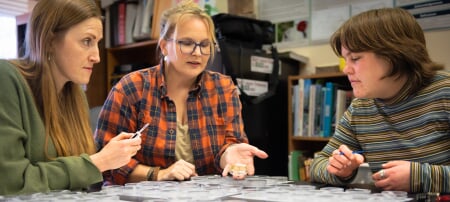Technology, the driver of our economy, has altered the value proposition of a college education.
Ask a Millennial a question and their thumbs instantly engage their smartphone. Pavlov would be proud of the conditioned response of today’s students when faced with the need to learn a new fact or recall a basic concept. For basic knowledge, the internet has become the classroom and the teacher is named Google. Basic knowledge has become a free commodity that can be acquired rapidly.
The School of Business and Economics embraces this innovation, not as a challenge to our role, but as an opportunity to rapidly progress our students from the attainment of theoretical knowledge to the practical application of knowledge.
In this issue of Impact, you will find the theme of the high-touch, high-impact, experiential education, which the School has firmly established as a center-piece of our educational process.
Dr. Andre Laplume has energized the entrepreneurship area through the Silicon Valley Experience, new business pitch competitions, and the Entrepreneurship Club. Dr. Jun Min led the Association of Student Marketing Researchers to provide marketing students with real-world projects, structured internships, and a launch point for their business plans. Working with Dr. Emanual Oliveira, SBE student Jerrid Burdue tackled a pressing public policy issue. He traveled to Washington D.C. to present his policy recommendations to the Department of Labor, the Treasury Department, industry leaders, as well as the majority and minority staff of the U.S. Congress.
This level of interaction with students requires faculty who understand their role extends well beyond the classroom walls. The role of past faculty member Sam Tidwell resonates today through the “pay-it-forward” stories of alumni Hugh Makens and Ed Robinson.
We are also delighted to report the Association to Advance Collegiate Schools of Business (AACSB) has extended our accreditation through 2020. This accreditation acknowledges the School’s significant increase in faculty research, the continuous improvement in our curriculum and degree programs, and the diligent and professional performance of our faculty and staff.
The past year we experienced the joys of congratulating Dr. Greg Graman, Dr. Eugene Klippel and Dr. Christa Walck on their well-deserved retirements. We also shared the grief of the passing of Michele Loughead, a dynamic and gifted educator.
Given shrinking state appropriations, we rely more than ever on donations from alumni and friends. The website provides several opportunities for donors wishing to direct their gifts. On behalf of the students, faculty and staff, thank you for your interest and support.
I’m proud to say, “The School of Business and Economics: Small Enough to Care, Large Enough to Lead!”
Michigan Technological University is an R1 public research university founded in 1885 in Houghton, and is home to nearly 7,500 students from more than 60 countries around the world. Consistently ranked among the best universities in the country for return on investment, Michigan's flagship technological university offers more than 185 undergraduate and graduate degree programs in science and technology, engineering, computing, forestry, business, health professions, humanities, mathematics, social sciences, and the arts. The rural campus is situated just miles from Lake Superior in Michigan's Upper Peninsula, offering year-round opportunities for outdoor adventure.




